Reintegrating Vulnerable Young People through Ticket to Life Initiative in Africa
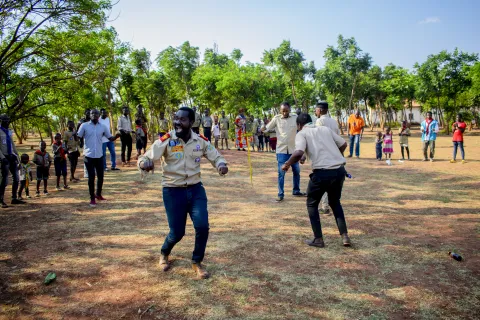
All children and youth are not fortunate enough to have a conducive environment for accessing appropriate development opportunities. The need to protect some children is certainly greater than others due to their specific socio-economic and political circumstances and geographical location. They are more vulnerable in terms of the risk to their right to life, development, protection, and participation. Children and youth in vulnerable groups face many challenges globally, from deprivation, exploitation, and neglect for no fault of their own and for reasons beyond their control.
Ticket to Life initiative aims at enabling vulnerable children and youth living in developing countries to become integrated into society. It provides Scouting activities adapted to their needs to build knowledge and skills, which help improve their quality of life. The initiative is currently being implemented in seven countries in the Africa Scout Region namely Benin, Botswana, Comoros, Democratic Republic of Congo, Kenya, Malawi, and Niger.
So far, the initiative has reached out to different disadvantaged segments of society impacting thousands of orphaned children, refugees, children of the streets, those living in marginalized societies, children living with disabilities, those in conflict with the law, and victims of HIV/AIDS among others.
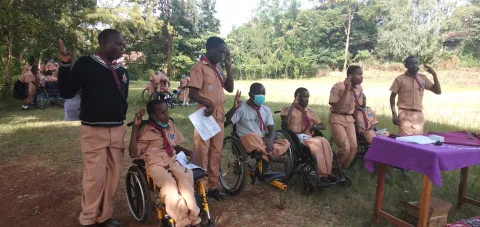
In Kenya, Ticket to Life Scout troops have been established in nine locations across the country, attracting a total of 288 young people into the movement. The focus of the initiative in the country is on making Scouting accessible and inviting to orphaned children and those living with disabilities. In all the Ticket to Life troops established, Kenya Scouts Association has made the educational programme material accessible, trained Scout leaders to handle the delicate groups with special needs and supported to establish income generating activities to promote self-reliance.
Mitoto Special School for the Blind in the western part of the country is the home for a new vibrant Scout troop. The young people there have benefitted not only from Scouting’s educational programme handbook being availed in braille but also from the donation of mattresses that was an urgent need for the institution. In Kisumu, Ring Road Orphans Day School is home to forty young Scouts living in extreme poverty. Ticket to Life has played an important role in ensuring that young people in the school can cater to their day-to-day needs by supporting them through the introduction of fish farming.
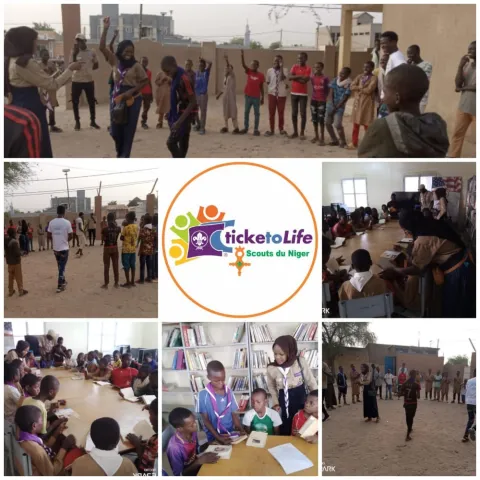
Like in all the other countries, Ticket to Life in Niger started by an induction training for the Scout leaders. This 3-day event brought together a team of thirty leaders from all eight regions of the country and representatives of local authorities and customary officials. Outside of Niger’s capital in Dosso region, Scouting has taken firm roots in the SOS Children’s Village. Here, the initiative has received tremendous support from the Office of the Governor of the region who provided facilities to conduct Scouts’ training and ample security during activities. This outspoken support has seen Scouting win the hearts of many guardians and the troops have consistently been growing in numbers. In Niamey, hope has been restored at l’Orphelinat Bon Samaritain (Good Samaritan Orphange) by engaging the children in fun and educational Scouting activities.
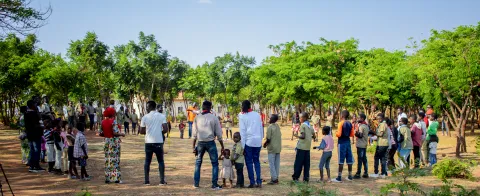
Fifty-five kilometres from Malawi’s capital Lilongwe is Dzaleka Refugee Camp. Originally designed to host 12,000 people, the camp is now home to over 50,000 people, half of which are children. Poverty, competition, and discrimination are not strange issues to the children living in the camp. The Scout Association of Malawi has made significant contributions to improving life for the children at Dzaleka through the Ticket to Life initiative. As a result, Scout Leaders in the camp are now being provided with training and resources for their Scout groups. This support enables them to engage Scouts in developing skills and supporting their community and to enhance their personal growth. Moreover, the implementation of Ticket to Life has led to a more standardized approach to Scouting within the camp, aligning it with the educational programmes and priorities of Scouting in Malawi. The first experimental Scout camp done within the refugee camp left smiles on the faces of young people, many of them valuing the new friendships they made, and the life skills learned.
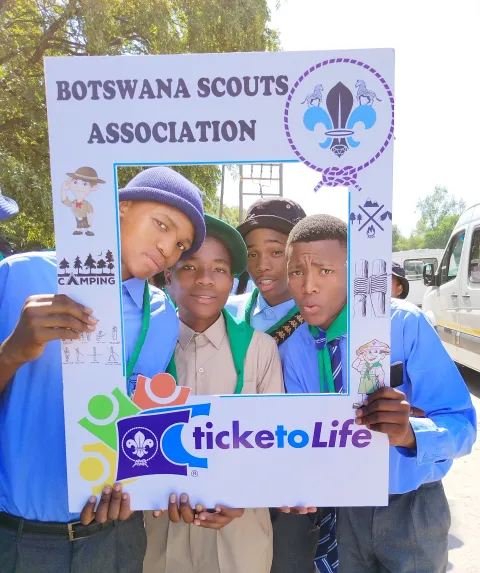
Further down in Botswana, settlers in Dukwi Refugee Camp have benefitted through the Ticket to Life Initiative implemented by the Botswana Scouts Association. Children from different countries who reside in camp have had the opportunity to bond, entertain each other, and learn new skills through Scouting.
The streets are no home to any child. This has been the driving force for the Scouts in the Democratic Republic of Congo in their implementation of the Ticket to Life initiative. At Likemo Centre of Bandalungwa community, twenty-four children aged 11-16 years have been recruited to join a newly formed Scout troop. As fate would have it, mental health is an important aspect of reintegrating this segment of young people into society. A team of thirty Scout leaders have received training on how to deal with the special nature of these young people, ensuring they feel safe, engaged, and part of their community, while offering them non-formal education and basic life skills through Scouting. Recruitment efforts are still ongoing with the hope of reaching out to the many more young people living on the streets, educating and supporting their reintegration into society while allowing them to play an active role in their own development.
In Benin, the Scouts have made significant strides in setting up Scout troops in reception centers for street children and orphanages. More than ten Scout units have been set up for the benefit of children who live in particularly difficult conditions with about 200 orphans and street children benefiting from Scouting education. Ticket to Life has helped to instill Scout values in young people, boost their self-esteem and strengthen team spirit, while preparing them for life as responsible adults. As part of the community integration plan, young people are receiving entrepreneurial skills training which is an important aspect in contributing to their self-reliance. Ticket to Life in Benin has already attracted a partnership opportunity with a civil society organization, Street Citizen, who have allocated a vast piece of land to the Scouts for the implementation of an agro-pastoral project (Food for Life) for the benefit of the children in the Scout group.
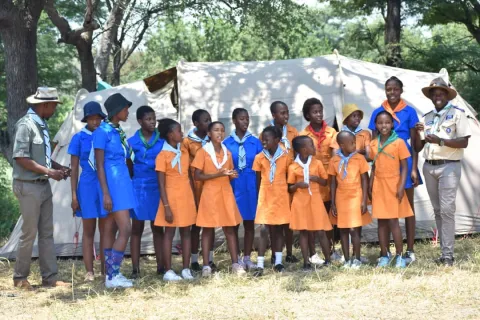
Comoros has not been left behind in the implementation of Ticket to Life. Focusing on orphaned, abandoned and children living in extreme poverty, the Scouts have reached out to young people from all four regions on the Islands, attracting 800 of them who have now joined the newly formed Scout troops.
The Ticket to Life initiative has been a blessing to the Africa Scout Region by reaching over 4,000 beneficiaries in just two years. We are committed to continue equipping our adult leaders with the necessary skills to handle the different vulnerable children joining Scouting across Africa, and to ensure they too have a fulfilling experience. In the next phase, the initiative will reach out to more vulnerable young people in other countries to give them an equal opportunity to benefit from the educational programme of Scouting and a chance to contribute to their own development into responsible citizens. As the years pass by, we look forward to seeing the recruited young people transition into future Scout leaders and help us to scale the initiative even further.
Learn more about Ticket to Life on the website
The project was implemented thanks to the longstanding support and partnership of the World Scout Foundation. Ticket to Life Initiative helps vulnerable children and young people by providing holistic services through special implementation of the Scouting’s Youth Programme that addresses education and training needs along with social support and life skills.